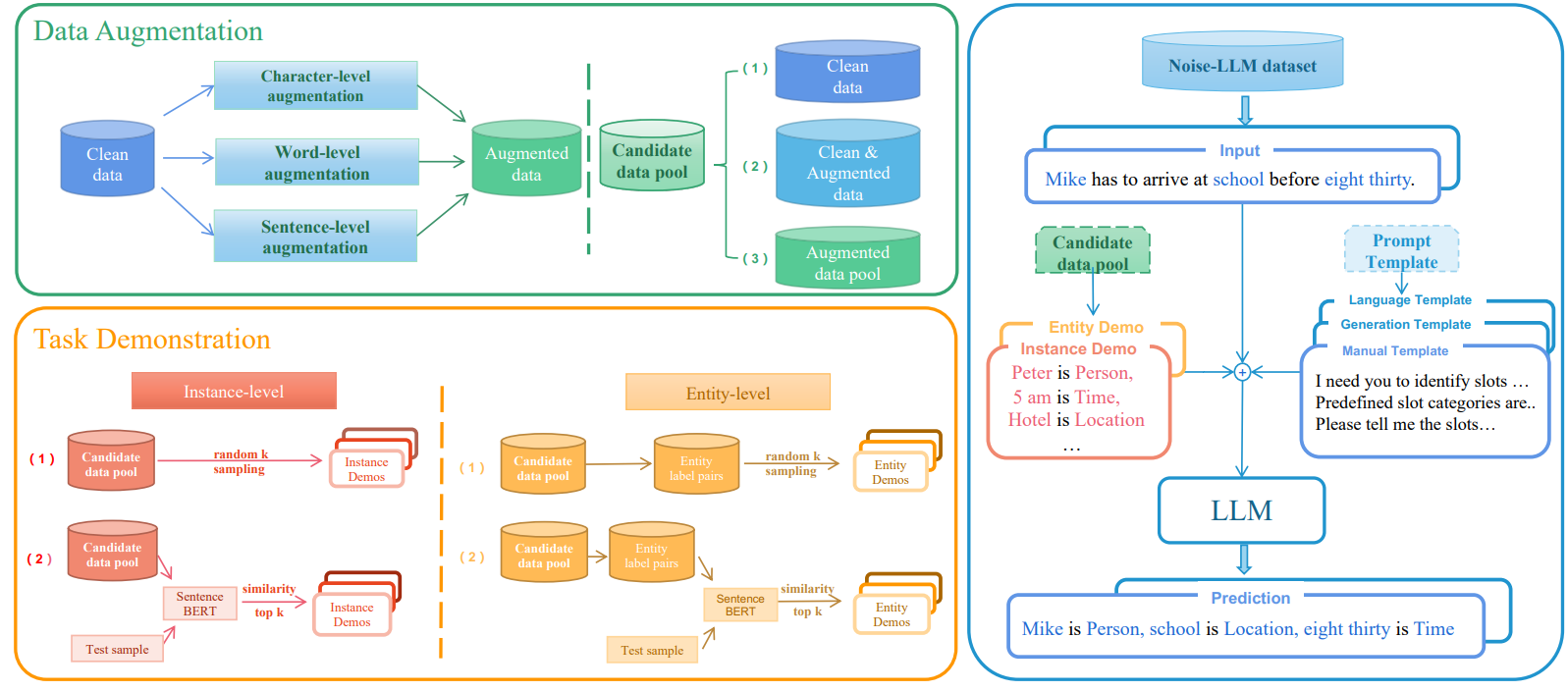Revisit Input Perturbation Problems for LLMs: A Unified Robustness Evaluation Framework for Noisy Slot Filling Task
This repository contains the open-sourced official implementation of the paper:
Revisit Input Perturbation Problems for LLMs: A Unified Robustness Evaluation Framework for Noisy Slot Filling Task (NLPCC 2023 Oral Presentation).
If you find this repo helpful, please cite the following paper:
@misc{dong2023revisit,
title={Revisit Input Perturbation Problems for LLMs: A Unified Robustness Evaluation Framework for Noisy Slot Filling Task},
author={Guanting Dong and Jinxu Zhao and Tingfeng Hui and Daichi Guo and Wenlong Wan and Boqi Feng and Yueyan Qiu and Zhuoma Gongque and Keqing He and Zechen Wang and Weiran Xu},
year={2023},
eprint={2310.06504},
archivePrefix={arXiv},
primaryClass={cs.CL}
}This is the repository for our work Noise-LLM, which is received by NLPCC 2023 Oral Presentation.
Noise-LLM assess how well various robustness methods of LLMs perform in real-world noisy scenarios.
With the increasing capabilities of large language models (LLMs), these high-performance models have achieved state-of-the-art results on a wide range of natural language processing (NLP) tasks. However, the models' performance on commonly-used benchmark datasets often fails to accurately reflect their reliability and robustness when applied to real-world noisy data.
We propose a unified robustness evaluation framework based on the slot-filling task to systematically evaluate the dialogue understanding capability of LLMs in diverse input perturbation scenarios. Specifically, we construct a input perturbation evaluation dataset, Noise-LLM, which contains five types of single perturbation and four types of mixed perturbation data.
Furthermore, we utilize a multi-level data augmentation method (character, word, and sentence levels) to construct a candidate data pool, and carefully design two ways of automatic task demonstration construction strategies (instance-level and entity-level) with various prompt templates. Our aim is to assess how well various robustness methods of LLMs perform in real-world noisy scenarios. The experiments have demonstrated that the current open-source LLMs generally achieve limited perturbation robustness performance.
We have provided the API code for inquiring ChatGPT. Please fill in your own API key to complete the testing locally. The Noise LLM dataset is linked in ./Noise-LLM/single-noise-raddle and ./Noise-LLM/snips.
Set up environment:
pip install openaiEvaluation:
cd ./Noise-LLM
python chatgpt.pyIn the future, we will improve the code for data loading to implement the automation evaluation process of Noise-LLM.
| Model | Clean | Typos | Speech | Paraphrase | Simplification | Verbose | Overall |
|---|---|---|---|---|---|---|---|
| NAT | 96.01 | 67.47 | 85.23 | 87.73 | 87.32 | 85.41 | 87.21 |
| NAT | 96.04 | 67.54 | 85.16 | 87.42 | 87.33 | 85.29 | 87.27 |
| PSSAT | 96.42 | 68.34 | 85.65 | 91.54 | 89.73 | 85.82 | 88.16 |
| Text-davinci-003 | 43.09 | 34.26 | 39.34 | 38.42 | 40.12 | 37.18 | 38.54 |
| ChatGPT | 71.43 | 40.65 | 60.00 | 55.56 | 65.54 | 55.56 | 57.21 |
| ChatGPT+Instance level | 68.21(-3.2) | 65.04(+24.3) | 70.56(+10.5) | 58.82(+2.2) | 73.02(+7.4) | 61.77(+6.2) | 68.34(+11.1) |
| ChatGPT+Entity level | 74.07(+2.6) | 62.18(+21.5) | 55.39(+4.6) | 75.59(+18.9) | 70.96(+5.4) | 71.75(+16.1) | 71.55(+14.3) |
| Model | Clean | Typos | Speech | AppendIRR | Spe+Ty | Spe+App | Ent+App | Spe+App+Typ | Overall |
|---|---|---|---|---|---|---|---|---|---|
| Text-davinci-003 | 31.24 | 27.18 | 23.41 | 27.48 | 19.32 | 19.78 | 20.73 | 18.84 | 24.64 |
| ChatGPT | 59.65 | 42.11 | 34.83 | 45.61 | 27.58 | 31.03 | 26.38 | 26.11 | 38.18 |
| ChatGPT+Instance level | 67.18 | 48.94 | 42.25 | 52.61 | 34.26 | 38.79 | 38.64 | 30.67 | 46.58 |
| ChatGPT+Entity level | 65.71 | 47.36 | 40.37 | 53.42 | 36.55 | 37.35 | 34.21 | 29.06 | 44.27 |
